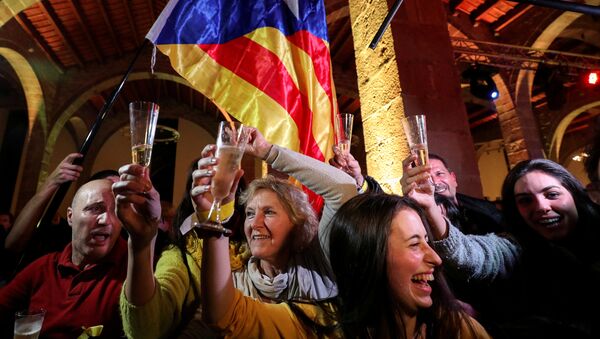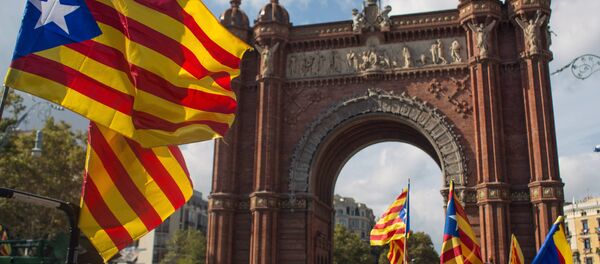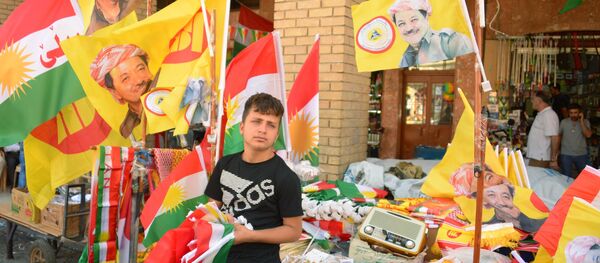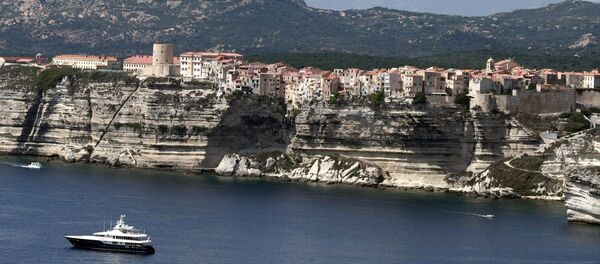The success of each referendum differs from the next. Despite the majority of Catalans supported the region’s secession from Spain at the referendum, the country’s central authorities have employed various restrictive measures against the regional independence movement, including deploying police to prevent the vote from happening and making regional separatist leader Carles Puigdemont flee to Belgium.
The referendum in Iraq’s Kurdistan resulted in the majority of the regional population backing independence, too. In a similar way, the vote was labeled as illegal by Baghdad, following the Kurds losing territories under their control as a result of the Iraqi Army offensive, and the resignation of regional head Masoud Barzani.
Residents of the two Italy’s regions also propped the claims of their pro-autonomy authorities for gaining more powers from Rome in the referendum. In this case, the central authorities responded with readiness to hold talks on the devolution of powers with the regions.
Independentismo Catalán
Among the 2017 referendums, Catalonia’s October 1 independence vote and events around it, has been covered most extensively by media in Europe and across the world.
Catalonia, which has always been one of the richest and most prosperous Spanish regions, has long claimed that it was paying in taxes to Madrid more than it received back in investment and services. According to the Catalan government’s official figures, the region’s Gross Domestic Product (GDP) per capita forms 18.9 percent of the total Spanish GDP. It is also 18.8 percent higher than the Spanish average, 13.2 percent higher than the average of all 28 EU member states, and 6.1 percent higher than the GDP in the euro area.
The groundwork for the 2017 independence vote was laid by the non-binding self-determination referendum, held by the Catalan authorities in 2014. Despite the central government back then ruled holding a formal vote unconstitutional, the unofficial plebiscite in the 7.5-million-strong community resulted in over 80 percent of 2.2 million Catalan voters supporting secession from Spain.
The 2014 referendum results were surpassed in the 2017 referendum, which was held despite objections from the Spanish authorities. Madrid has repeatedly ruled Catalan referendum legislation illegal as well as carried out what many called a crackdown on the regional separatists to prevent the vote from happening. However, on October 1, over 90 percent of the 2.26 million Catalans who participated in the referendum supported their region's secession from Spain.
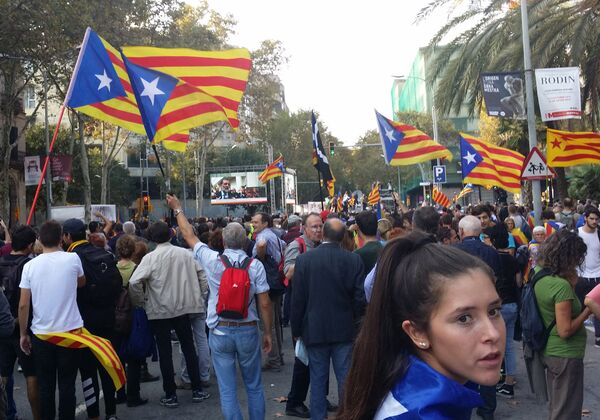
The vote itself was, however, overshadowed by violent clashes between independence supporters and police officers who tried to prevent the referendum from taking place.
"Catalonia won the right to become an independent state as a result of the referendum. I will put off declaring independence from Spain and will try to seek a dialogue with the central government in a few weeks," Puigdemont said on October 11, reiterating the need for dialogue between Catalonia and Madrid, and calling for mediation from the European Union.
Since Puigdemont’s calls were left unanswered by both Madrid and the European Union, which has called the crisis a Spanish internal affair, Catalonia declared its independence on October 27. The move prompted Spanish Prime Minister Mariano Rajoy to sack Puigdemont, introduce direct Spanish governance in Catalonia and dissolve the regional parliament.
READ MORE: Spanish Gov't to Invoke Constitution's Article 155, Quashing Catalan Autonomy
Rajoy’s decision has been decried by Puigdemont, who refused to recognize it and called Madrid’s stance the “worst attack on Catalan institutions since the dictator General Franco ordered the end of our autonomy.”
As the situation developed, Madrid started trials against the pro-independence Catalan politicians who were involved in organizing the illegal referendum and proclaiming the region’s independence.
In late October, Puigdemont fled Spain for Belgium, where he started his campaign for the snap Catalan parliamentary vote, slated for December 21.
Shattered Dreams of Iraqi Kurds
Like in Catalonia, separatist and nationalist sentiments have been strong among the Kurds in Iraq, where the ethnic minority forms about 20 percent of the country’s population since Iraq’s creation in 1921.
Kurdish autonomy was legalized by the 2005 Iraqi constitution. Despite this, the Kurds wanted more independence and have been claiming that the Iraqi army was unable to protect them amid the dire security situation caused by Daesh activities both in the country and the Middle East as a whole.
More importantly, the Kurds’ autonomous oil exports, opposed by Baghdad, which has claimed authority over Kurdistan’s mineral resources, has further exacerbated disagreements between Erbil and the Iraqi central government.
Shrinking oil prices over the past years have led to an economic crisis in the Kurdistan region. The situation was worsened when Baghdad stopped paying the salaries of Kurdish Regional Government (KRG) civil servants in 2014 in protest against the Kurds' independent oil exports. The payments have since been reinstated by Bagdad in return for the Kurds sharing around a half of their oil revenues with Baghdad.
Barzani’s mandate has since been extended by the Kurdistan Consultative Council, a governmental body in charge of considering administrative disputes in the region, until late 2017. Many have claimed, however, that Barzani has used the nationalist and separatist sentiments within Kurdish society to his advantage, and called the September 23 independence referendum to restore his personal credibility.
The Kurds’ strong aspirations for independence were reinforced by polls conducted ahead of the referendum. In particular, a study carried out by the Kurdish Knowledge Center consultancy suggested that 52.9 percent of Kurds would have supported independence at the upcoming vote, while 25.6 percent would have said no, 3.6 percent would have abstained, and 17.9 percent were undecided.
Despite Baghdad saying that the Kurdish independence referendum was unconstitutional, on September 23, the Kurdish government held the vote in the region, as well as the territories of Iraqi provinces that are claimed by both Erbil and Baghdad. The Kurdish authorities have said that over 90 percent of voters voted for secession.
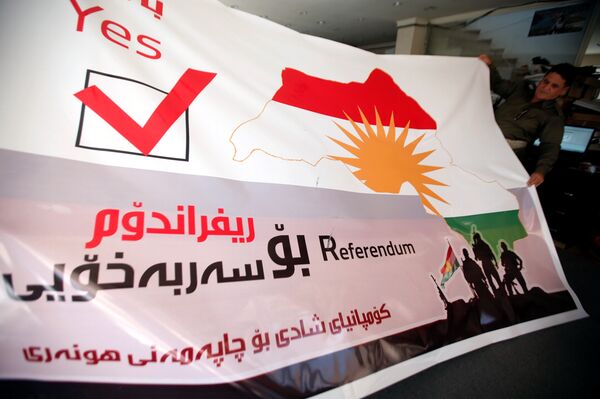
The move provoked a harsh response from Baghdad, which involved economic restrictions, closing the region’s border checkpoints and stopping international air traffic. Moreover, the Iraqi army launched an offensive on the disputed regions and advanced in direction of the Kurdish border.
READ MORE: Independence Crisis: Iraqi Kurdistan's Government Was in a Lose-Lose Position
Erbil, in turn, offered to freeze the referendum results, and, like Catalonia, suggested holding talks with Baghdad on the region’s status in exchange for the end to the central government’s military offensive. In response to the offer, Iraqi Prime Minister Haider Abadi said that Baghdad would only accept the cancellation of the referendum results and full compliance with the country’s constitution.
The crisis led to Barzani’s resignation.
“Nobody stood with us other than our mountains,” Barzani said in his resignation speech, pointing to the lack of support from other Middle Eastern countries for Kurdistan’s independence.
Northern Italy’s Strive For Devolution
While the whole world followed the developments in the Catalan crisis and aftermath of the Kurdish vote, Italy’s northern Lombardy and Veneto regions held non-binding referendums on October 22. The votes were aimed at gaining more autonomy from Rome in such areas as taxation, security, immigration, education, and environmental policies.
Similarly to Catalonia, both regions, which together account for around 30 percent of Italy’s GDP, claimed they have been paying more in taxes to the central authorities than what they were getting back.
READ MORE: Italy's Veneto, Lombardy Vote for Autonomy, Yet Have Long Way to Go
Lombardy and Veneto are governed by the Northern League party, which has been striving for the independence of the wealthy regions. The party has once been the main proponent of Padanian nationalism, which promotes the creation of an independent state called Padania on the territory of northern Italy. However, the party has since redirected its goal toward striving for autonomy as part of the country.
“Compared to Catalonia, this is a legitimate referendum. The police will be at the polling stations to vote and to help those who vote. In Barcelona, unfortunately, things ended in bloodshed. We have chosen a longer, harder path but it’s a more serious one,” Matteo Salvini, the party’s leader had said ahead of the referendums.
In Veneto, voter turnout was around 58 percent, with over 98 percent of residents voting “yes.” In Lombardy, voter turnout was slightly lower at 40 percent, and the number of greater autonomy supporters exceeded 95 percent.
The Italian regions’ approach to gaining independence, as described by Salvini, has so far proven itself more effective in practice. In particular, the regions’ authorities are planning to formally start talks on the dissolution of powers with Rome before Italy’s next general election in May 2018. The central government, specifically Italian Prime Minister Paolo Gentiloni, has, in turn, expressed readiness to engage in talks with Lombardy and Veneto.
Driving Forces
Experts agreed that economic interests were a driving force behind the various referendums.
“For example, the EU member states have sought to impose austerity to their people as the way out of the crisis. By doing so they became easy targets for regional ambitious politicians, who found very conveniently ‘ok, we could place the blame on national governments.’ I think this is what happened in Catalonia for example,” Dimitrios Argyroulis, political economics scholar at the UK University of Sheffield, told Sputnik.
In Lombardy and Veneto, the economic factor was the key motivation behind their referendums, Theofanis Exadaktylos, senior lecturer in European politics at the UK University of Surrey, told Sputnik.
“If we look at the Catalan case, there’s an economic reason behind it [too]. We know that Catalonia one of the wealthiest regions in Spain, it generates a significant part of Spain’s GDP,” Exadaktylos added.
At the same time, the exploitation of economic factors by referendum organizers has been viewed by anti-separatist forces as selfishness on the part of regional elites.
“Spanish opponents of the referendum, like British opponents of the 2014 Scottish independence referendum, accuse the separatists of greed. In this view, separatists are selfish elites who want to keep their wealth for themselves and not share it with their fellow countrymen,” Russell Foster, a Leverhulme Early Career fellow in the Department of European and International Studies at King's College London, told Sputnik.
The experts further noted that the identity factor still prevailed as a reason behind the referendums in all three regions mentioned.
“Economic forces are one factor, but they are not the most important factor … In the cases of Catalonia, Lombardy and Veneto, there are economic causes and there are long-standing historical and cultural claims to be a separate culture to the nation. But paramount is a growing sense across Europe, that people in the same nation-state no longer identify with that nation. The Kurdish referendum was not economically motivated, instead, it was motivated by a desire for a Kurdish homeland (a claim which is centuries old) and a desire for collective security in the world's most volatile area,” Foster explained.
The plebiscites this year had more to do with the way “historical events have shaped the identity of the people, and even strength of regional institutions,” Argyrols said, mirroring his colleague’s remarks.
“The issue of [Catalan] identity has been quite oppressed during the [former Spanish leader Francisco] Franco years. [The Catalans] were not allowed to speak their language and so no, so it is a real issue. But beyond identity, the point is to be able to promote that within the current structures of Spain, the trigger for this was the inflexibility of the central Spanish government to allow more autonomy, to discuss certain issues. The issue is not only pushed on one side, the issue is always pushed from the two sides,” Exadaktylos suggested.
2018 May Support the Trend
The events of this year have indicated that the independence movements may continue gaining momentum in 2018.
In Italy, for example, following the success of the referendums as an effective method of initiating a dialogue with the central government, the Northern League’s leader said his party was preparing for similar votes in other Italian regions, namely Apulia, Piedmont, Abruzzo, and Emilia-Romagna, in the coming years.
READ MORE: France's New Caledonia Agrees With Paris on 2018 Independence Referendum
Additionally, 2018 is the deadline for New Caledonia to hold its own referendum on independence from France under the 1998 Noumea Accord, which provides for the phased decolonization of the Pacific archipelago. In early November, the leadership of the French territory agreed with the country’s central authorities during talks in Paris on the logistics of the upcoming referendum.
Back in Europe, Scottish First Minister Nicola Sturgeon, in her annual address in October, pledged to hold another referendum on the country’s independence from the United Kingdom by 2021. Pro-independence sentiments in Scotland have been strong for decades and grew even more after the 2016 Brexit referendum. While the majority of the UK nationals supported leaving the European Union, the Scots demonstrated their firm commitment to remaining within the bloc.
The development of the situation in Catalonia, particularly the outcome of its December 21 parliamentary election, will significantly influence independence movements, which have potential to result in referendums in the upcoming years, the experts suggested.
“If we see an increase of the support for pro-independence parties [at the elections]… I can’t say there will be independence, but I think the pressure will increase,” Exadaktylos noted.
However, if the Catalan elections result in lowered support for pro-independence forces, the local authorities will in the future strive for increased autonomy, rather than independence, the expert suggested.
There are a lot of EU member states that have independence movements within, Exadaktylos said, listing Italy, Germany, Belgium, and France among them. However, according to Foster, in order to reach successful results, independence movements in these countries needed to recognize that their populations were not solely composed of separatists.
“By giving assurances to their non-separatist populations that non-separatist voices will be heard and respected in campaigns, they could potentially increase their chances of success. But the very nature of secession creates hostility and contempt between loyalists and separatists, so such emotions are inevitable regardless of what separatist campaigns say,” Foster pointed out.
The expert also noted that criticism of Puigdemont in Catalonia arose because the former regional leader had no clear plan on how to deal with the European Union.
Foster suggested that it was highly likely that over the next two years, European countries would devolve more financial and political powers to local governments after witnessing how pro-autonomy referendums could turn into internal crises.
“The point is not be responsive, but to be pre-emptive, devolving powers down to the regional level before the region has actually demanded it, I think is a better practice. I think there needs to be a wider discussion about the involvement of local element in the political process versus centralization,” Exadaktylos pointed out.
The European Union can also play a constructive role in preventing crises inside its member states. According to Argyroulis, while it considered independence movements within its member states as the internal affairs of each respective country, the European Union could through its institutions help increase the devolution of powers and autonomy of its member states’ regions, thereby mitigating the independence drive of regional elites.
